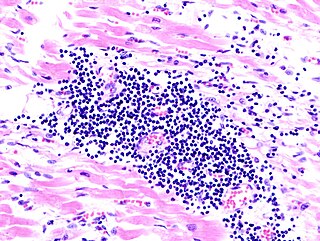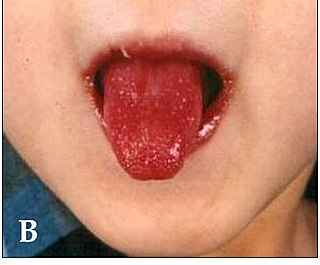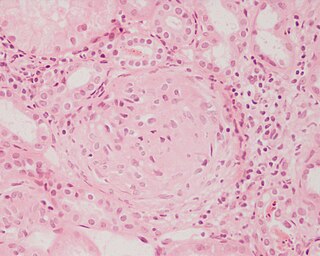Related Research Articles

Inflammation is part of the complex biological response of body tissues to harmful stimuli, such as pathogens, damaged cells, or irritants, and is a protective response involving immune cells, blood vessels, and molecular mediators. The function of inflammation is to eliminate the initial cause of cell injury, clear out necrotic cells and tissues damaged from the original insult and the inflammatory process, and initiate tissue repair.

Myocarditis, also known as inflammatory cardiomyopathy, is inflammation of the heart muscle. Symptoms can include shortness of breath, chest pain, decreased ability to exercise, and an irregular heartbeat. The duration of problems can vary from hours to months. Complications may include heart failure due to dilated cardiomyopathy or cardiac arrest.
Cytokine release syndrome (CRS) is a form of systemic inflammatory response syndrome (SIRS) that can be triggered by a variety of factors such as infections and certain drugs. It refers to cytokine storm syndromes (CSS) and occurs when large numbers of white blood cells are activated and release inflammatory cytokines, which in turn activate yet more white blood cells. CRS is also an adverse effect of some monoclonal antibody medications, as well as adoptive T-cell therapies. When occurring as a result of a medication, it is also known as an infusion reaction.
Multiple organ dysfunction syndrome (MODS) is altered organ function in an acutely ill patient requiring medical intervention to achieve homeostasis.

Kawasaki disease is a syndrome of unknown cause that results in a fever and mainly affects children under 5 years of age. It is a form of vasculitis, where blood vessels become inflamed throughout the body. The fever typically lasts for more than five days and is not affected by usual medications. Other common symptoms include large lymph nodes in the neck, a rash in the genital area, and red eyes, lips, palms, or soles of the feet. Within three weeks of the onset, the skin from the hands and feet may peel, after which recovery typically occurs. In some children, coronary artery aneurysms form in the heart.

Uveitis is the inflammation of the uvea, the pigmented layer that lies between the inner retina and the outer fibrous layer composed of the sclera and cornea. The uvea consists of the middle layer of pigmented vascular structures of the eye and includes the iris, ciliary body, and choroid. Uveitis is an ophthalmic emergency and requires a thorough examination by an ophthalmologist or optometrist and urgent treatment to control the inflammation. It is often associated with other ocular problems.

Glomerulonephritis (GN) is a term used to refer to several kidney diseases. Many of the diseases are characterised by inflammation either of the glomeruli or of the small blood vessels in the kidneys, hence the name, but not all diseases necessarily have an inflammatory component.
A cytokine storm, also called hypercytokinemia, is a physiological reaction in humans and other animals in which the innate immune system causes an uncontrolled and excessive release of pro-inflammatory signaling molecules called cytokines. Normally, cytokines are part of the body's immune response to infection, but their sudden release in large quantities can cause multisystem organ failure and death. Cytokine storms can be caused by a number of infectious and non-infectious etiologies, especially viral respiratory infections such as H5N1 influenza, SARS-CoV-1, and SARS-CoV-2. Other causative agents include the Epstein-Barr virus, cytomegalovirus, and group A streptococcus, and non-infectious conditions such as graft-versus-host disease. The viruses can invade lung epithelial cells and alveolar macrophages to produce viral nucleic acid, which stimulates the infected cells to release cytokines and chemokines, activating macrophages, dendritic cells, and others.
Immune reconstitution inflammatory syndrome (IRIS) is a condition seen in some cases of AIDS or immunosuppression, in which the immune system begins to recover, but then responds to a previously acquired opportunistic infection with an overwhelming inflammatory response that paradoxically makes the symptoms of infection worse.

Human coronavirus NL63 (HCoV-NL63) is a species of coronavirus, specifically a Setracovirus from among the Alphacoronavirus genus. It was identified in late 2004 in a seven-month-old child with bronchiolitis in the Netherlands. The virus is an enveloped, positive-sense, single-stranded RNA virus which enters its host cell by binding to ACE2. Infection with the virus has been confirmed worldwide, and has an association with many common symptoms and diseases. Associated diseases include mild to moderate upper respiratory tract infections, severe lower respiratory tract infection, croup and bronchiolitis.
Periodic fever syndromes are a set of disorders characterized by recurrent episodes of systemic and organ-specific inflammation. Unlike autoimmune disorders such as systemic lupus erythematosus, in which the disease is caused by abnormalities of the adaptive immune system, people with autoinflammatory diseases do not produce autoantibodies or antigen-specific T or B cells. Instead, the autoinflammatory diseases are characterized by errors in the innate immune system.
Tocilizumab, also known as atlizumab, is an immunosuppressive drug, mainly for the treatment of rheumatoid arthritis (RA) and systemic juvenile idiopathic arthritis, a severe form of arthritis in children. It is a humanized monoclonal antibody against the interleukin-6 receptor (IL-6R). Interleukin 6 (IL-6) is a cytokine that plays an important role in immune response and is implicated in the pathogenesis of many diseases, such as autoimmune diseases, multiple myeloma and prostate cancer. It was developed by Hoffmann–La Roche and Chugai.
Chronic systemic inflammation (SI) is the result of release of pro-inflammatory cytokines from immune-related cells and the chronic activation of the innate immune system.

La Jolla Institute for Immunology is a non-profit research organization located in La Jolla, California. It is located in UC San Diego’s Research Park. The Institute researches immunology and immune system diseases. The Institute employs 23 faculty members and more than 300 employees. Dr. Mitchell Kronenberg has served as its President and Scientific Director since 2003. The Institute was founded in 1988.

An autoimmune disease is a condition arising from an abnormal immune response to a functioning body part. There are at least 80 types of autoimmune diseases. Nearly any body part can be involved. Common symptoms include low grade fever and feeling tired. Often symptoms come and go.
Immunoglobulin therapy, also known as normal human immunoglobulin (NHIG), is the use of a mixture of antibodies (immunoglobulins) to treat a number of health conditions. These conditions include primary immunodeficiency, immune thrombocytopenic purpura, chronic inflammatory demyelinating polyneuropathy, Kawasaki disease, certain cases of HIV/AIDS and measles, Guillain-Barré syndrome, and certain other infections when a more specific immunoglobulin is not available. Depending on the formulation it can be given by injection into muscle, a vein, or under the skin. The effects last a few weeks.

Coronavirus disease 2019 (COVID-19) is a contagious disease caused by severe acute respiratory syndrome coronavirus 2 (SARS-CoV-2). The first case was identified in Wuhan, China, in December 2019. It has since spread worldwide, leading to an ongoing pandemic.

Symptoms of COVID-19 are variable, ranging from mild symptoms to severe illness. Common symptoms include fever, cough, fatigue, breathing difficulties, and loss of smell and taste. People with the same infection may have different symptoms, and their symptoms may change over time. For example, one person may have a high fever, a cough, and fatigue, and another person may have a low fever at the start of the disease and develop difficulty breathing a week later. However, in people without prior ears, nose, and throat (ENT) disorders, loss of taste combined with loss of smell is associated with COVID-19 with a specificity of 95%.

Multisystem inflammatory syndrome in children (MIS-C), or paediatric inflammatory multisystem syndrome, is a rare systemic illness involving persistent fever and extreme inflammation following exposure to SARS-CoV-2, the virus responsible for COVID-19. It can rapidly lead to medical emergencies such as insufficient blood flow around the body. Failure of one or more organs can occur. A warning sign is unexplained persistent fever with severe symptoms following exposure to COVID-19. Prompt referral to paediatric specialists is essential, and families need to seek urgent medical assistance. Most affected children will need intensive care.

A systematic review notes that children with COVID-19 have milder effects and better prognoses than adults. However, children are susceptible to multisystem inflammatory syndrome, a rare but life-threatening systemic illness involving persistent fever and extreme inflammation following exposure to the SARS-CoV-2 virus.
References
- ↑ "Multisystem inflammatory syndrome in children and adolescents with COVID-19: Scientific brief". www.who.int. World Health Organization. Archived from the original on 15 May 2020.
- ↑ Guidance - Paediatric multisystem inflammatory syndrome temporally associated with COVID-19 (PDF), The Royal College of Paediatrics and Child Health, May 2020
- ↑ "Rapid risk assessment: Paediatric inflammatory multisystem syndrome and SARS-CoV-2 infection in children". European Centre for Disease Prevention and Control. 15 May 2020. Archived from the original (PDF) on 15 May 2020.
- ↑ Morris SB, Schwartz NG, Patel P, et al. (October 2020). "Case series of multisystem inflammatory syndrome in adults associated with SARS-CoV-2 infection - United Kingdom and United States, March-August 2020". MMWR. Morbidity and Mortality Weekly Report. 69 (40): 1450–1456. doi: 10.15585/mmwr.mm6940e1 . PMC 7561225 . PMID 33031361.
- ↑ McCrindle BW, Rowley AH, Newburger JW, Burns JC, Bolger AF, Gewitz M, Baker AL, Jackson MA, Takahashi M, Shah PB, Kobayashi T, Wu MH, Saji TT, Pahl E (2017). "Diagnosis, Treatment, and Long-Term Management of Kawasaki Disease: A Scientific Statement for Health Professionals From the American Heart Association". Circulation. 135 (17): e927–e999. doi: 10.1161/CIR.0000000000000484 . PMID 28356445.
- ↑ Jaffer, U; Wade, R G; Gourlay, T (2010). "Cytokines in the systemic inflammatory response syndrome: a review". HSR Proceedings in Intensive Care & Cardiovascular Anesthesia. 2 (3): 161–175. ISSN 2037-0504. PMC 3484588 . PMID 23441054.
- ↑ James, William; Berger, Timothy; Elston, Dirk (2005). Andrews' Diseases of the Skin: Clinical Dermatology. (10th ed.). Saunders. ISBN 0-7216-2921-0.